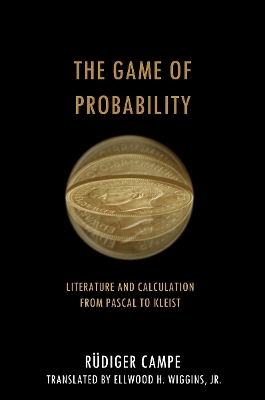
The Game of Probability
Literature and Calculation from Pascal to Kleist
Seiten
2013
Stanford University Press (Verlag)
978-0-8047-6865-8 (ISBN)
Stanford University Press (Verlag)
978-0-8047-6865-8 (ISBN)
This book demonstrates how, in the Europe of the seventeenth and eighteenth centuries, literary writers, philosophers, and mathematicians together developed and shaped the idea of modern probability, both scientifically and aesthetically.
There exist literary histories of probability and scientific histories of probability, but it has generally been thought that the two did not meet. Campe begs to differ. Mathematical probability, he argues, took over the role of the old probability of poets, orators, and logicians, albeit in scientific terms. Indeed, mathematical probability would not even have been possible without the other probability, whose roots lay in classical antiquity.
The Game of Probability revisits the seventeenth and eighteenth-century "probabilistic revolution," providing a history of the relations between mathematical and rhetorical techniques, between the scientific and the aesthetic. This was a revolution that overthrew the "order of things," notably the way that science and art positioned themselves with respect to reality, and its participants included a wide variety of people from as many walks of life. Campe devotes chapters to them in turn. Focusing on the interpretation of games of chance as the model for probability and on the reinterpretation of aesthetic form as verisimilitude (a critical question for theoreticians of that new literary genre, the novel), the scope alone of Campe's book argues for probability's crucial role in the constitution of modernity.
There exist literary histories of probability and scientific histories of probability, but it has generally been thought that the two did not meet. Campe begs to differ. Mathematical probability, he argues, took over the role of the old probability of poets, orators, and logicians, albeit in scientific terms. Indeed, mathematical probability would not even have been possible without the other probability, whose roots lay in classical antiquity.
The Game of Probability revisits the seventeenth and eighteenth-century "probabilistic revolution," providing a history of the relations between mathematical and rhetorical techniques, between the scientific and the aesthetic. This was a revolution that overthrew the "order of things," notably the way that science and art positioned themselves with respect to reality, and its participants included a wide variety of people from as many walks of life. Campe devotes chapters to them in turn. Focusing on the interpretation of games of chance as the model for probability and on the reinterpretation of aesthetic form as verisimilitude (a critical question for theoreticians of that new literary genre, the novel), the scope alone of Campe's book argues for probability's crucial role in the constitution of modernity.
Rüdiger Campe is Professor and Chair of German Language and Literature at Yale University.
| Erscheint lt. Verlag | 9.1.2013 |
|---|---|
| Reihe/Serie | Cultural Memory in the Present |
| Übersetzer | Ellwood Wiggins |
| Zusatzinfo | 3 tables |
| Verlagsort | Palo Alto |
| Sprache | englisch |
| Maße | 152 x 229 mm |
| Gewicht | 680 g |
| Themenwelt | Geisteswissenschaften ► Sprach- / Literaturwissenschaft ► Anglistik / Amerikanistik |
| Geisteswissenschaften ► Sprach- / Literaturwissenschaft ► Literaturwissenschaft | |
| Mathematik / Informatik ► Mathematik ► Geschichte der Mathematik | |
| Mathematik / Informatik ► Mathematik ► Wahrscheinlichkeit / Kombinatorik | |
| ISBN-10 | 0-8047-6865-X / 080476865X |
| ISBN-13 | 978-0-8047-6865-8 / 9780804768658 |
| Zustand | Neuware |
| Haben Sie eine Frage zum Produkt? |
Mehr entdecken
aus dem Bereich
aus dem Bereich
Poetik eines sozialen Urteils
Buch | Hardcover (2023)
De Gruyter (Verlag)
59,95 €
Buch | Softcover (2024)
belleville (Verlag)
20,00 €


